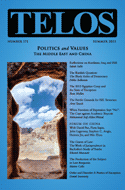By Telos Press · Saturday, September 11, 2021 Telos Zoom Discussion
September 18, 2021
4 pm to 6 pm U.S. Eastern time
Join Telos editors Mark Kelly, Tim Luke, Adrian Pabst, Marcia Pally, David Pan, and David Westbrook for a discussion of the causes of the U.S. failure in Afghanistan and the long-term consequences.
To attend, register here:
https://uci.zoom.us/meeting/register/tJMpf-ivqjMrEtVVTMSia1pfo_L9E2H-bwwk
We look forward to seeing you there.
Continue reading →
By Arno Tausch · Monday, September 25, 2017 This article summarizes a forthcoming analysis by the author under the tile Islamism, Arab Spring and the Future of Democracy: Developing a World Values Perspective, under contract at Springer Publishers, N.Y.
Sixteen years ago, on a bright and beautiful September morning in New York, Islamist terror against the West reached a new stage. The attacks, which began at 8:46 local time, killed 2,996 victims.
To equate “Muslims” with terrorism is unjust—just recall the heroic example of the Jordanian Air Force pilot Muath Safi Yousef Al-Kasasbeh, who, on January 3, 2015, was burnt alive by ISIS after his F-16 crashed during an operation across ISIS territory. He, too, was a believing Muslim and a Jordanian patriot. “Muslims” today also include the 9 percent of the Arab population who, according to data from the ACRPS Institute in Qatar, advocate the diplomatic recognition of Israel, despite the prevailing climate of anti-Israeli hysteria.
Continue reading →
By Arno Tausch · Monday, August 24, 2015
 This article presents statistical estimates of ISIL support in the Muslim world, based on Pew data covering 42 percent of the total global Muslim population on favorability of four terror organizations, to be well compared with ISIL: Hamas, Hezbollah, the Taliban, and al Qaeda, and the favorability of suicide bombing. It is assumed that these data (average support rates) reflect the true, but unknown, rates of ISIL support, which will be at somewhere around 17 percent of the entire global Muslim population. The article analyzes mechanisms that contribute towards ISIL favorability, such as anti-Americanism, the hatred of the State of Israel, and the advance of violent Islamism. Finally a comparison of the evolving terror scene with the conflict in Northern Ireland is also outlined. This article presents statistical estimates of ISIL support in the Muslim world, based on Pew data covering 42 percent of the total global Muslim population on favorability of four terror organizations, to be well compared with ISIL: Hamas, Hezbollah, the Taliban, and al Qaeda, and the favorability of suicide bombing. It is assumed that these data (average support rates) reflect the true, but unknown, rates of ISIL support, which will be at somewhere around 17 percent of the entire global Muslim population. The article analyzes mechanisms that contribute towards ISIL favorability, such as anti-Americanism, the hatred of the State of Israel, and the advance of violent Islamism. Finally a comparison of the evolving terror scene with the conflict in Northern Ireland is also outlined.
Continue reading →
|
|
 This article presents statistical estimates of ISIL support in the Muslim world, based on Pew data covering 42 percent of the total global Muslim population on favorability of four terror organizations, to be well compared with ISIL: Hamas, Hezbollah, the Taliban, and al Qaeda, and the favorability of suicide bombing. It is assumed that these data (average support rates) reflect the true, but unknown, rates of ISIL support, which will be at somewhere around 17 percent of the entire global Muslim population. The article analyzes mechanisms that contribute towards ISIL favorability, such as anti-Americanism, the hatred of the State of Israel, and the advance of violent Islamism. Finally a comparison of the evolving terror scene with the conflict in Northern Ireland is also outlined.
This article presents statistical estimates of ISIL support in the Muslim world, based on Pew data covering 42 percent of the total global Muslim population on favorability of four terror organizations, to be well compared with ISIL: Hamas, Hezbollah, the Taliban, and al Qaeda, and the favorability of suicide bombing. It is assumed that these data (average support rates) reflect the true, but unknown, rates of ISIL support, which will be at somewhere around 17 percent of the entire global Muslim population. The article analyzes mechanisms that contribute towards ISIL favorability, such as anti-Americanism, the hatred of the State of Israel, and the advance of violent Islamism. Finally a comparison of the evolving terror scene with the conflict in Northern Ireland is also outlined. 

